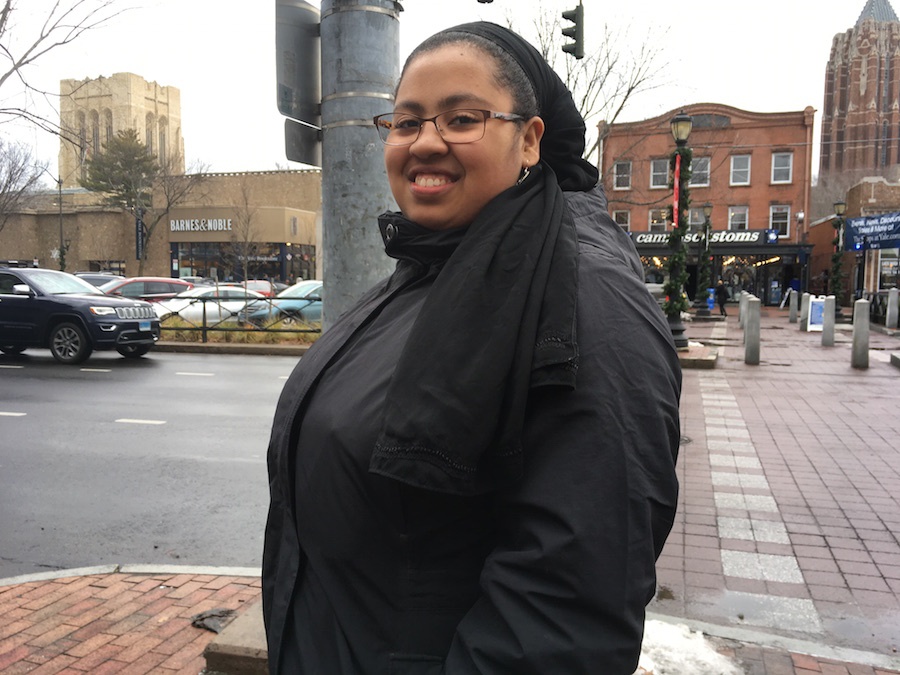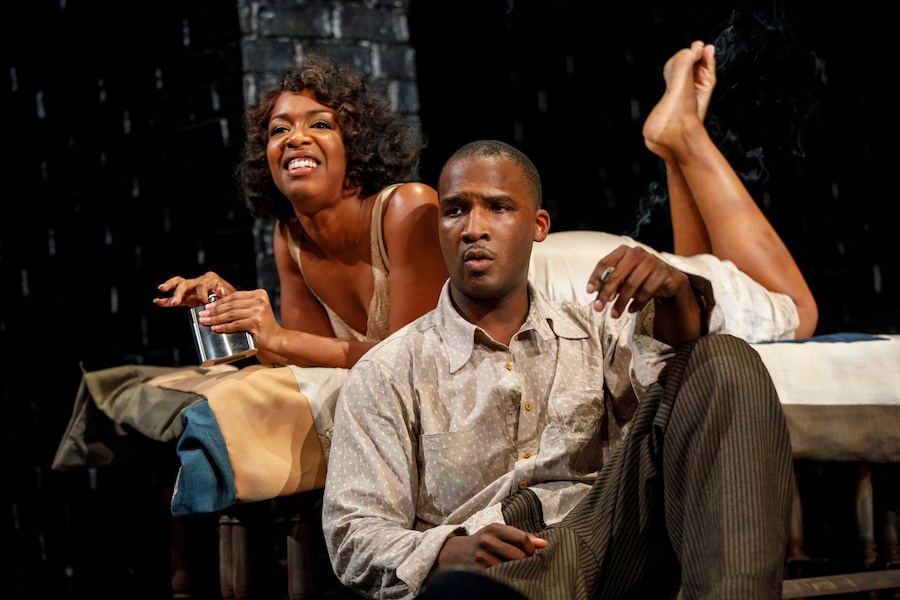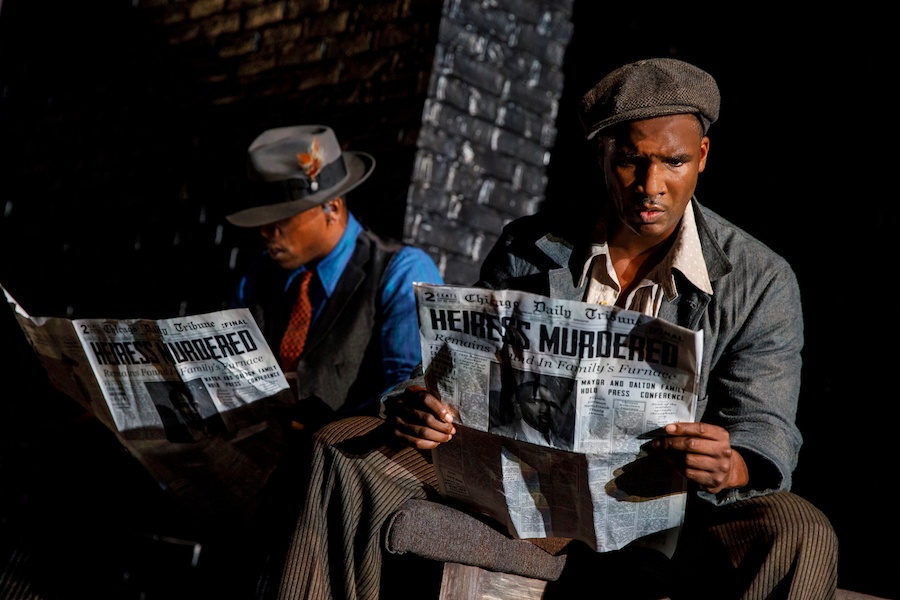
Top:
Jerod Haynes in Native Son by Nambi E. Kelley, adapted from the novel by Richard Wright, directed by Seret Scott. Photo by Joan Marcus, 2017. Bottom: Student Isis James. Lucy Gellman Photo.
Bigger Thomas may be a man from many years ago. Chicago may have an old minted glory, with snow lining the fire escapes and jazz piping from windows. But for Beacon Self-Directed Learning student Isis James, Native Son isn’t a document from eight decades ago. It’s pulsing and alive, right now, every time she has to remind someone that Black Lives Matter.
Tuesday morning, James brought that opinion—and the questions it gave birth to—to the Yale Repertory Theatre, as close to 500 students from greater New Haven packed the space for a special matinee performance of Nambi E. Kelley’s Native Son. The group comprised a mix of private and public schools from greater New Haven, including Beacon Self-Directed Learning, Cooperative Arts and Humanities High School and New Haven Adult and Continuing Education.
After a three-week run, the show closes Saturday night. Read The Arts Paper’s review here.
The student matinees are part of the Rep’s evolving “Will Power!” program, which provides students with lesson plans, reading guides, historical context and playwright, director and actor interviews. The program, Will Power’s 16th play, comes as part of a Rep-wide initiative to open the space to more (and younger) community members.
“Take a couple minutes and think about what questions you’d like to ask the actors,” said facilitator Jocelyn Prince, artistic coordinator at Yale Rep and a lecturer in Theater Management at the Yale School of Drama. “Moments in the show that really resonated with you, things that you found funny, or disturbing.”
Adapted from Richard Wright’s iconic novel of the same name, Native Son tells the story of Bigger Thomas, a 20-year-old Black man living with his mother and two siblings on Chicago’s South Side, in what is referred to as the city’s Black Belt. It is 1939, and the same Chicago with which Ta-Nehisi Coates opens “The Case for Reparations:” Black families are being pushed from their homes into worse neighborhoods, denied mortgages and lured in by proprietary lending schemes. Cramped one family to a kitchenette, the Thomases struggle to make it, working for wealthy white families who don’t pay them enough to get by.
Given a job through the relief effort, Bigger becomes a chauffeur for the rich Dalton family, tasked with schlepping around their daughter, Mary. In a horrible accident, Bigger smothers her, then knows he must get rid of the body. The rest of the play is his attempted flight from the situation, the story of a dead man walking that starts with Mary’s white privilege and goes deep down the systemic racism rabbit hole. Through it all, a new character named Black Rat (Jason Bowen) plays Bigger’s double consciousness, making clear just how, and on how many levels, Bigger is a product of his environment—a city that refuses to nurture him because of the color of his skin.
 Jessica Frances Dukes and Jerod Haynes in Native Son by Nambi E. Kelley, adapted from the novel by Richard Wright, directed by Seret Scott. Photo by Joan Marcus, 2017
Jessica Frances Dukes and Jerod Haynes in Native Son by Nambi E. Kelley, adapted from the novel by Richard Wright, directed by Seret Scott. Photo by Joan Marcus, 2017.
In the past weeks, Isis James had prepared for those scenes, reading the book and working with her class on two 90-minute lesson plans. But she’s also been preparing outside of the classroom, where she is an activist and practicing Unitarian Universalist. A member of Black Lives Matter and Black Lives of Unitarian Universalism (BLUU), she said she has learned firsthand about “dealing with your own white supremacy and anti-blackness so you can move forward.”
“This is my life, and the reality of how I’m going to live through the world,” she said.
As the lights came up on a shirtless Bigger Thomas (Jerod Haynes), she focused in on those words, watching as the spotlight shifted from Bigger on a fire escape to the low-talking Black Rat on another, his hat tipped down, concealing his face.
With hundreds of other students in the auditorium, she took it all in: The tiny room in which Bigger’s family was forced to live. The words that Mrs. Dalton uses to proclaim her cluelessness, with more than one statement like “you and I are more alike than you think, Bigger.”
The sharp cry that Bigger’s lover Bessie (Jessica Francis Dukes) gives when she is raped, and the thud her body gives when it shares Mary’s fate, but none of her fame and mystique. The characters as they rotate around Bigger on a moving platform, whispering “run” in ten different voices. The moment when he does, toward death, and is finally free of the city’s shackles.
At the end of the show, as actors trickled out on stage for a post-show talkback, her hand was one of the first to go up.
 Jason Bowen and Jerod Haynes in Native Son by Nambi E. Kelley, adapted from the novel by Richard Wright, directed by Seret Scott. Photo by Joan Marcus, 2017.
Jason Bowen and Jerod Haynes in Native Son by Nambi E. Kelley, adapted from the novel by Richard Wright, directed by Seret Scott. Photo by Joan Marcus, 2017.“How does it feel to portray and act in a position where you are…” James trailed off, and then began again. “Where your internalized anti-blackness and white supremacy and racism puts you in a position where you hurt somebody, because of all these other events that were not your fault?”
“There we go,” said Haynes. “There we go.”
He took a deep breath. “I feel like that’s the job,” he continued. “To hopefully spark some kind of change.”
Maybe it’s not an easy show for high schoolers to stomach, he added. Racism is a bitter and constant pill to swallow, and it’s not getting better so many years after Native Son was first published. But it’s also a necessary one. He recalled reading an article about 14-year-old George Stinney, who was falsely accused and convicted of raping and murdering two white women in 1944, in a small mill town in South Carolina. At the time of his execution, Stinney’s body was so small that he had to sit on top of a bible to fit in the chair.
“To know that you can shoot down Laquan Macdonald 16 times and reload, because he had a knife 100 feet away—yeah, I think it’s our job to get up here and tell these stories, and put a mirror up to society,” he said. “Hopefully we can spark some change. Unfortunately, it’s 2017, and the fact that you’re able to ask that question, that’s the problem. So I think, for everyone in this room who came to see this play … just hold yourself accountable and great things can happen.”
Down the row of actors, actress Rosalyn Coleman shifted and snapped into motion. She plays Bigger’s mother in the show.
“I think it feels sad to play the parts but it feels important, and it feels really good to be asked that question in that particular way,” she said. “It feels like we did our job.”
Back outside the theater, James said she was reinvigorated. Not because Native Son had taught her something new about internalized racism. But because the actors had urged her to keep fighting.
“It was good to see it portrayed,” she said after the talkback, walking back on Whalley Avenue with her class. “And I was glad to have the preparation. If you didn’t have the preparation, it could seem like another racist thing about how Black people are horrible. It was a very powerful thing, and kind of all of it resonated and stuck out to me. There were definitely things that were hard to watch, because I can see how it could happen to people I know.”
“It’s difficult to see how these things happen to people, and how they’re still happening.”